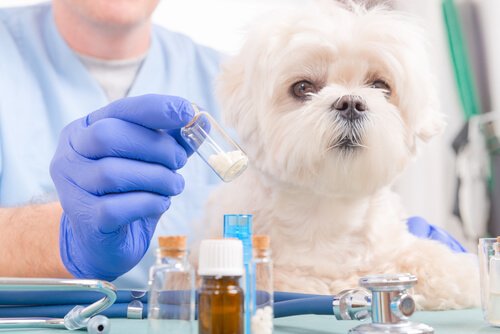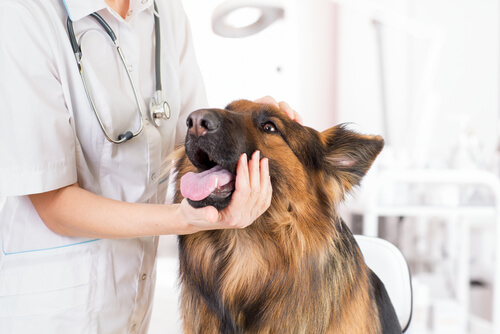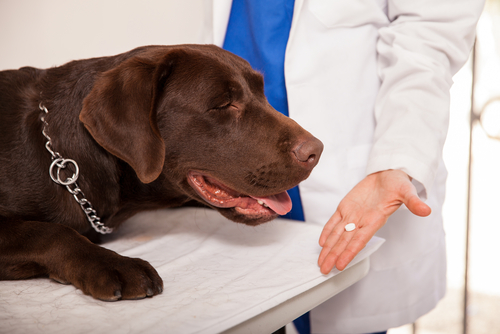Ibuprofen Poisoning in Dogs

A serious mistake that people make all too often is giving human drugs to dogs. Pain-relievers and fever-reducers are dangerous for them. Their bodies are different, and without a proper prescription, they’re very risky. Among these dangerous medications, ibuprofen is at the top of the list. Today we’ll discuss all sorts of information about ibuprofen poisoning in dogs.
Why Ibuprofen is Risky
Who doesn’t have painkillers in their medicine cabinet? Who doesn’t use them? It’s a common and usually safe practice for humans. However, when a dog is carelessly given painkillers, it can be harmful — even fatal.
Ibuprofen is produced and designed specifically for the human body. Even in low doses, it can cause significant problems in dogs. Ibuprofen poisoning in dogs is a proven fact. Medicating a pet with ibuprofen is a serious mistake with major consequences, and yet it’s still common.

Whether it’s because human drugs are what people have on hand, because they’re cheaper than drugs made for animals, or because people don’t want to spend money on a vet visit, dog owners often give their pets ibuprofen.
What You Should Know About Ibuprofen Poisoning in Dogs
Unfortunately, ibuprofen, paracetamol and aspirin intoxication are the most common types of poisonings. It is estimated that one in three people gives one of these medications to their pets.
An animal’s body is very different than a human’s body. Thus, humans process medication very differently than animals, too. There are certain enzymes in the body that attack drugs. In animals, these enzymes are different, as are the methods the body uses to remove medications.
This means that some substances remain in a dog’s body. Since it isn’t made to eliminate them correctly and completely, poisoning results. So, what happens? To sum up, the animal’s body is not prepared to receive and process this type of medication and does not eliminate toxic substances. This is the cause of ibuprofen poisoning in dogs.
What Problems Does Ibuprofen Cause for Dogs?
Ibuprofen interferes with the substances that protect the lining of a dog’s stomach. The toxins in the medication also inhibit blood circulation in their kidneys. Therefore, damage primarily occurs in these two organs.
Anything that a dog’s body does not remove accumulates in his kidneys and liver. Over time, this can cause hemorrhaging, kidney failure and even death.
Is a Certain Dose of Ibuprofen Not Toxic for Dogs?
Regardless of the dose of ibuprofen, it is always toxic to dogs. Half a pill, for example, could poison a 50 kg dog. Gastric ulcers, kidney problems, and heart problems may occur. It could also damage their nervous system, leading to seizures or coma. The consequences depend on the dog’s size; a small dose could be lethal to small dogs.
Exceptions
Although some vets prescribe very low doses of acetaminophen to animals, you should only do so if you and your dog first see the vet and get their approval.
Some countries have relevant regulations. For example, the Spanish Agency of Medicines and Medical Devices establishes which human medications can be used for dogs, along with the proper prescriptions. Ibuprofen is not on the list of approved medications.
One of the problem is that none of these dangerous medications provide instructions on proper use for animals, and it’s a huge mistake to assume that a child’s dose will do.
Symptoms of Intoxication in Dogs
If your pet has ingested ibuprofen, the following symptoms indicate possible poisoning:
- Weakness
- Drowsiness
- Nausea and vomiting
- Cramps
- Diarrea
- Dark or black stools
- Kidney failure

Tips and Advice
Last but not least, here are a few helpful tips on the subject:
- Never give human medications to pets (even if the dose seems insignificant).
- Keep your first-aid kit, as well as any other medication, out of your dog’s reach.
- If your dog gets sick, see a trusted veterinarian. They will tell you what medications are suitable for your dog and tell you the exact dose (including how to administer it). If your veterinarian is truly trustworthy, even a simple phone call may be sufficient.
- If you notice any symptoms, immediately see a veterinarian.
